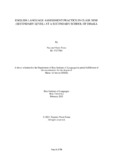| dc.contributor.advisor | Zilany, Golam Kader | |
| dc.contributor.author | Toma, Nazratul Naim | |
| dc.date.accessioned | 2021-08-03T08:03:54Z | |
| dc.date.available | 2021-08-03T08:03:54Z | |
| dc.date.copyright | 2021 | |
| dc.date.issued | 2021-02 | |
| dc.identifier.other | ID 17277001 | |
| dc.identifier.uri | http://hdl.handle.net/10361/14927 | |
| dc.description | This thesis is submitted in partial fulfillment of the requirements for the degree of Masters of Arts in Teaching to Speakers of Other Languages, 2021. | en_US |
| dc.description | Cataloged from PDF version of Thesis. | |
| dc.description | Includes bibliographical references (pages 60-64). | |
| dc.description.abstract | A systematic and well-organized assessment process paves the path of successful language learning. Many studies have concluded that the English curriculum policy and actual assessment scenario fall short in bridging the inconsistency with curriculum goals. The primary focus of this study is to explore the current English Language Assessment practice in class nine (secondary level) at a secondary school located in Dhaka city. The study illustrates both explorative and qualitative in nature. In fact, Qualitative purposeful convenient snowball sampling was used to explore how do the EFL teachers in class nine (secondary level) assess their students’ English language skills (reading, writing, speaking, and listening)? and what type of challenges do the EFL teachers and students face in class nine (secondary level) during assessment or while being assessed on English language skills? Four students and four teachers were chosen from a secondary school located in Dhaka city. The study surveyed that teachers have already started applying CLT method in the classroom. However, teachers find it problematic to incorporate formative assessment on all four skills from the textbook due to backdated technology, short class duration and sheer volume of students’ number. In case of summative assessment, both reading and writing skills are hardly reflected in communicative and creative English whereas listening and speaking skills are still excluded from it. The overall slow-paced assessment situation is standing in the way of learners’ language skill development. Furthermore,still the incompatibility between the English curriculum policy and actual assessment practice scenario, are likely to deviate from its projected curriculum goals as the assessment system is poorly designed in relation to the curriculum.Policy makers as well as other stakeholders need to take necessary steps for the sake of learner’s proper English language learning, where all four skills are of equal significance in both assessments. On the other hand, teachers are required to get ample training as required for cultivating the culture of effective learning. | en_US |
| dc.description.statementofresponsibility | Nazratul Naim Toma | |
| dc.format.extent | 70 pages | |
| dc.language.iso | en | en_US |
| dc.publisher | Brac University | en_US |
| dc.rights | BRAC University theses are protected by copyright. They may be viewed from this source for any purpose, but reproduction or distribution in any format is prohibited without written permission. | |
| dc.subject | English Language Curriculum | en_US |
| dc.subject | Assessment | en_US |
| dc.subject | English Language Teaching-Learning | en_US |
| dc.subject | Secondary level | en_US |
| dc.subject | Communicative Language Teaching (CLT) | en_US |
| dc.subject | Bangla medium | en_US |
| dc.subject.lcsh | Education, Secondary | |
| dc.subject.lcsh | English language -- Study and teaching -- Foreign speakers. | |
| dc.title | English language assessment practice in class nine (secondary level) at a secondary school of Dhaka | en_US |
| dc.type | Thesis | en_US |
| dc.contributor.department | Brac Institutes of Languages | |
| dc.description.degree | M. in TESOL | |

